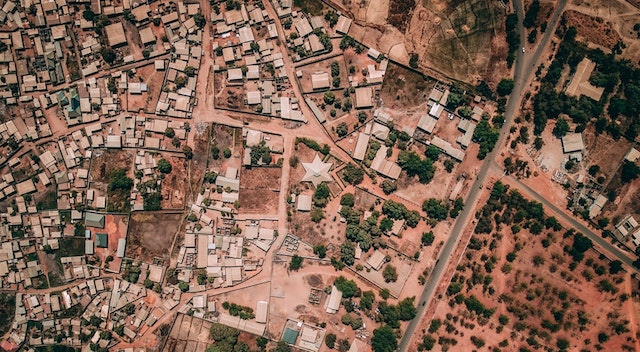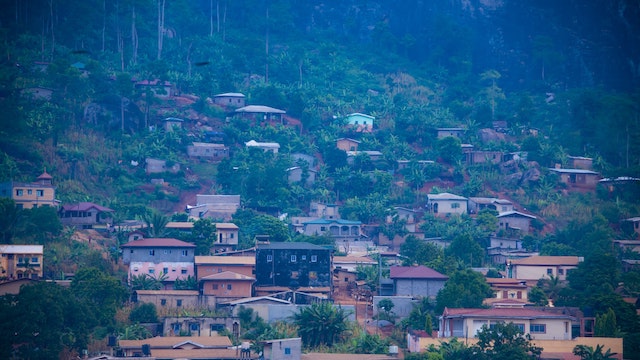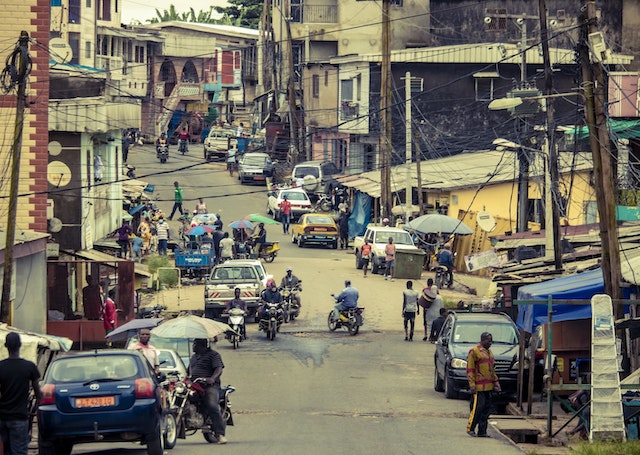Find everything women travelers in Cameroon need to know about health, romance, women’s rights and safety.
All the information below is provided by Pink Pangea community members based on their experiences abroad. Add your voice!
Feminine Hygienic Products
Gretchen says: Tampons are extremely hard to find, especially outside of large cities, so you’d do well to bring them with you. Pads are available; quality will vary depending on what region you’re in. Personally, I just bring a Diva Cup and can’t recommend it (or another menstrual cup) enough if you’re traveling in sub-Saharan Africa. It’s easy, it’s pit latrine-friendly, it doesn’t take up space in my luggage.
If you’re looking for feminine products in a larger city or town, you’ll likely find at least a few choices in any of the larger supermarkets. In smaller towns, beauty boutiques should carry them. Villages are going to be hit or miss with supply of feminine products as they are with anything else that has to come in on a truck.
Birth Control
Gretchen says: Both male and female condoms are widely available, and it’s socially acceptable for either sex to buy them in most places. Quality can get iffy outside of the major cities, though, so I recommend bringing some from home if you expect you may be sexually active.
If you use a prescription birth control, get as much as you possibly can from home. If you’re going to be in Cameroon short term, try to work it out so that you don’t have to renew or fill anything while you’re here. In fact, if you’re going to be here long term for work, talk with your employer about their medical resources and recommendations.
Recommended Gynecologists and Doctors
Gretchen says: I’ve not personally visited a gynecologist in Cameroon, but I know a few people who have. Based on their experiences, I recommend avoiding in-country gynecology appointments if at all possible. If it’s urgent, and your employer doesn’t have a recommendation, or you’re traveling independently, contact your embassy.
They should be able to direct travelers to vetted medical professionals, and if they can’t, don’t be afraid to push them for information on which gynecologist their employees see.
Breastfeeding
Gretchen says: Breastfeeding is completely socially acceptable. It’s totally normal for women to feed their babies wherever they need to, and they seldom cover up. Breasts are not sexualized in the same way that they are in the Western world, though a foreigner breastfeeding on the street would attract a lot of attention, and I expect that most of it would be negative.
Romance
Dating Locals
Gretchen says: The most important thing to remember if you’re thinking of dating or hooking up with a local in Cameroon is that sex education in this country is, in a word, lacking. Especially for women, there is a great deal of shame and embarrassment associated with hormones and sexuality; the mindset surrounding general sexuality can be described as repressive on a good day. This doesn’t mean you shouldn’t consider dating locals, of course. It just means you need to exercise caution, as should you everywhere else in the world.
Much of Cameroon is also quite conservative where relationships are concerned. Dowry ceremonies exist here, and the level of importance and seriousness attached to that tradition will vary family to family. I’ve met young men around my age who tell me that they believe in total equity in a partnership. One told me that he wants to always have the same level of education as his wife and vice versa. “If she has her Masters, I will have my Masters. If I have my PhD, she will have hers, too.”
I’ve also met men around my age who continue to fixate on ultra-traditional roles. And I have not thus far met a man who was born and raised in Cameroon who truly sees women as being on the same playing field as him. Even in the case of the sweet friend who wants to be equal in education believes that he is meant to have the last say in all things.
Vocal, stubborn women—feminists, really—are often seen as a novelty, an anomaly that can be tamed by the right man. It is a domineering culture, and it’s very important to be aware of that.
However, I still know of expat-local couples who have dated very successfully, some of them even marrying.
Men
Gretchen says: Cameroon is an extremely diverse country, and “typical” types of men vary from city to city, region to region, ethnic group to ethnic group, religious background to religious background. The following five classifications of men are based on my experience in Ngaoundéré, and are extremely generalized.
University students: Male university students that I typically encounter are a bit on the wild side, but can be really fun and really good friends to have. They, like university women here, are often very enthusiastic about whatever they’re studying, and are down to have academic conversations, which I love.
Travelers: Men in Cameroon who have traveled overseas can often be a breath of fresh air if you’re coming from a country more liberal than this one. They tend to understand why you, as a foreign woman, get frustrated by marriage proposals, and are much more inclined to be platonic friends.
Papas: A lot of middle-aged and older Cameroonian men are just delightful. Some of them dérange (“déranger” is a French verb that doesn’t have an excellent English equivalent, but essentially applies to cat calling and general bothering of women and foreigners. It does translate to “to disturb or annoy.”) but many are sweet. One of my favorite things to do here is to sit down with older tailors or carpenters as they work and ask them questions about Cameroon and their perspective on the world in general.
Tips for Women Travelers in Cameroon
Draguers: These are the guys on the street and in restaurants and bars who insists on catcalling, proposing marriage, or simply starting a conversation based on a woman’s looks or skin color. These interactions unfortunately range from totally harmless to intense and unwanted, and often your discomfort will not be validated because, like in my home culture, “it’s a compliment.” “Draguer,” like “déranger,” doesn’t have a great English equivalent, but essentially translates to “flirter.”
Military guys: my experience this year with the Cameroonian military has, so far, been positive. It’s not the norm for members of the military to carry large guns around here, unlike some other sub-Saharan African countries, so they present a much less intimidating identity when you see them on the road or on public transportation.
Occasionally, I’ll run into military guys who seem to think they’re entitled to behave however they want just because they’re military, but so far this year that demographic has been nearly nonexistent and my encounters with soldiers have been quiet and respectful.
[/symple_toggle]LGBTQ Friendly
Gretchen says: Non-hetero sexuality is illegal in Cameroon. They are quieter about it than other countries on the continent, but according to Human Rights Watch, Cameroon has actually arrested and prosecuted more sexual minorities than any other country in sub-Saharan Africa. Like other African countries I’ve visited, the general population typically explains to me that homosexuality is a phenomenon created by the Western world and exported to Africa.
Despite the illegality of their sexuality, I actually still know quite a few LGBTQ expats here who are doing quite well. Suppressing such an important part of yourself can take a toll mentally and emotionally, but the important thing is to plug into an LGBTQ/ally community as soon as possible. It’s possible to lead a good life and even maintain a relationship here, though the relationship has to be clandestine. Regrettably, under no circumstances should you be openly out here.
Women's Rights
Women’s Rights
Gretchen says: Women are not equal to men. In many parts of Cameroon, even if a women doesn’t work, raises children and takes care of a house, she is seen as a driving force for the family. Certainly, women in traditional roles here can be powerful.
However, both traditionally and legally, men still hold the final say in all things. Men have undisputed custody over children in Cameroon. If a man leaves his wife, he gets to take the children. If a woman becomes pregnant out of wedlock with a man who is already married, that man can take her child to live in his wife’s house.
Professionally, women are able to work their way up. More and more, powerful women are found in offices, sometimes with the same position as male counterparts, and other times even as bosses. I don’t know anything about a wage gap situation here, but if I had to guess, I would assume that women are not operating on an equal pay scale.
Tips for Women Travelers in Cameroon
Education is also not guaranteed for women. Young girls are significantly more likely to drop out of school in order to help their mothers in the household, or to sell peanuts or bananas on the road.
It’s not hard to observe women’s standing in Cameroonian society. Most street food vendors are women, girls, or young boys. Most businesses that require a level of expertise from their employees, like cellphone service companies or import-export businesses, are run and staffed by men. It is inequitable enough here that I still get visibly excited when I see a woman doing a job that I would typically see a man doing.
[/symple_toggle]Local Women
Gretchen says: Local women are typically fairly docile in public, and take on a domestic role at a young age. It’s assumed that all women know how to cook and maintain a household. (Confession: sometimes I tell men the half-truth that I don’t like cooking just to see the look of horror on their faces.)
It is not uncommon here to see girls of six or seven years old walking down the street carrying babies on their backs. Maternal instincts are tapped early here; gender roles are filled nearly always without question when in public.
My home culture, by comparison, is much more open to women rejecting non-traditional roles, or choosing to put career, education, or life in general before marriage or “family life.” But, like at home, when women are together in private, conversation is usually much more free-flowing, more open and honest. Women can be real with each other here, but not necessarily real with men.

Tips for Women Travelers in Cameroon
Women-Specific Environments
Gretchen says: Generally, women aren’t explicitly forbidden from going anywhere. Public spaces are generally male-dominated, but I’ve never felt unsafe sitting down at a bar or restaurant in which I am the only woman, even when I’m alone.
It’s possible that you’ll be looked at with curiosity, but not hostility. The same seems to be true for Cameroonian women. I don’t typically see groups of women going out together- large groups are predominantly male with a woman or two- but I have also never seen them chased from a place or made to feel blatantly unwelcome. That doesn’t mean it doesn’t sometimes happen.
The exception to this is mosques. Islam separates men’s and women’s prayer spaces, so if you’re planning on visiting a mosque, be aware of that and respectfully ask where you are and are not allowed to go before wandering. My experience with Cameroonian Islam has been positive.
Perception of Foreign Women
Gretchen says: Unfortunately, my status as an American (and before that, my skin color) automatically marks me as wealthy. No matter how much of a struggle I feel money is in the States, the fact remains that I’ve certainly had it easier than most Cameroonians, which makes the “wealthy” stereotype difficult to argue. It doesn’t matter to anyone that I’m here on a grant, and therefore on a fixed, relatively small income.
I’m still an American. Women tell me that they need work, or ask for school fees for their children, while men often suggest that I can help them get a visa or, my least favorite, casually mention the idea of marrying me so that they can come to the States.
I’m also frequently met with shock when I say that I’m single. An unmarried, foreign woman of twenty-four seems ridiculous to a lot of people. I am regularly told that I should really get married and have a baby, and then leave the baby with my husband and continue working and traveling.
It’s sometimes difficult to deal with, but ultimately it’s a fairly straightforward cultural difference, and I really believe that it’s important to engage in those conversations and do your best to explain yourself and your cultural context. And, of course, allow those you’re talking with to do the same.
Safety
Transportation
Gretchen says: During the day, any and all transportation is a safe choice. Car taxis, moto taxis, buses, and the train are all viable options for women traveling, whether solo or in a group. After dark, however, options become more limited for several reasons. First of all, roads in Cameroon get more dangerous after nightfall due to questionable quality of the roads and oft-encountered reckless driving habits in a country in which traffic laws, if they exist at all, are very rarely enforced.
Secondly, moto taxi drivers have a reputation for being drunk and/or high on the job once the sun goes down. The stereotype can’t be applied to all, of course, but it’s not a risk you want to get in the habit of taking. And third, women moving at night are easier targets, especially for motos or for empty car taxis. It’s prudent to have a couple of car taxis on speed dial for late night pick-ups.

Shady Areas for Women
Gretchen says: Aside from the Extreme North, which is currently forbidden for all foreigners, I can generalize and say that Cameroon is as safe for women during the day as it is for men (when exercising, of course, basic common sense.) However, at night, it’s unwise for a woman to walk alone unless she is very familiar with the area, i.e. she is walking in a small village in which she lives and knows the security situation.
Clothing
Gretchen says: The rule for foreign women here is to stick to bottoms that at least hit the tops of your knees, and to avoid strappy and/or low-cut tops unless they’re accompanied by a scarf, a cardigan, or the like. In Yaoundé or Douala, Cameroon’s two major hubs, women are seen in everything from tiny miniskirts to fully-covering traditional wear.
I still suggest that foreigners try to dress conservatively, because we do automatically draw more attention anyway, but personal judgement can come into play there.
However, when you move outside of those cities, you should absolutely stick to the above rules. I suggest spending the first day or two in a new place with knees and shoulders covered whenever you’re walking around. You can take a little time to observe how the local women are dressed, then react accordingly. Here in the Adamaoua, I’ll go out in public in a sleeveless top, but never in spaghetti straps.
My knees, at least, are always fully covered here, and I actually prefer to cover my legs to the ankles.
Ultimately, when in doubt, air on the conservative side.
Tips for Women Travelers in Cameroon
Have you traveled to Cameroon? How was your trip? Email us at [email protected] for information about sharing your experience and advice with the Pink Pangea community. We can’t wait to hear from you.



Dual citizenship is not legally recognized at this time.
It is true. The extreme North should be avoided as it is frequently victim of terrorist attacks and kidnapping.
What did Gretchen mean by saying “aside from the Extreme North, which is currently forbidden for all foreigners,”? As far as I can tell from the quick google search I just did, that is not true. I was wondering if someone could explain that? I’m curious to know more.
I will be going to Cameroon in October to climb Mount Cameroon! Thanks for the tips xx
I am wanting to know is there dual citizenship allowed yet in Cameroon. I met a individual from there and he is wanting to move to Cameroon Yaounde but has no interest in moving to the states. I don’t want to give up my United States citizenship if we get married and move to Cameroon.